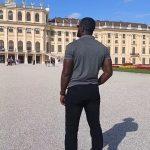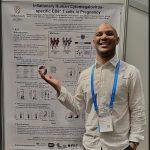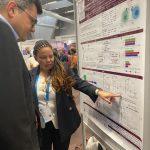Summaries of Experiences at the 19th International Congress of Immunology (IUIS 2025)
Vienna, Austria
17–22 August 2025
Doudou Georges Massar Niang

My journey to the IUIS 2025 Congress began on August 16th, 2025, with my arrival in Vienna. From the moment I left the airport, the stunning Austrian landscape provided a breathtaking backdrop that immediately gave me the intuition that this would be a truly exceptional scientific event. Eager to begin, I proceeded directly to the Austria Centre Vienna to collect my conference badge and finalise my registration in preparation for the Pre-Congress Master Class series scheduled for the following day.
Immunopaedia Ambassador – Doudou Georges Massar Niang
Brandon Paarwater
 The IUIS brings together immunologists from all over the world, showcasing all the various niches of Immunology, whether it’s inflammation, neuroimmunology, autoimmunity, cancer or tissue immunology. Here, the global immunology community unites not only to share knowledge and the latest key findings, but also to expand our understanding of immunity in the context of health and disease. But strongly fostering collaboration to improve health worldwide, as outlined in the mission statement of the IUIS. I attended the IUIS2025, the 19th Congress of Immunology, held in Vienna, Austria, to expand my horizons in immunology as a young scientist and to be inspired by the pioneers in the field. I am privileged and honoured to be a TIGRIS scholar, who sponsored my experience at IUIS 2025.
The IUIS brings together immunologists from all over the world, showcasing all the various niches of Immunology, whether it’s inflammation, neuroimmunology, autoimmunity, cancer or tissue immunology. Here, the global immunology community unites not only to share knowledge and the latest key findings, but also to expand our understanding of immunity in the context of health and disease. But strongly fostering collaboration to improve health worldwide, as outlined in the mission statement of the IUIS. I attended the IUIS2025, the 19th Congress of Immunology, held in Vienna, Austria, to expand my horizons in immunology as a young scientist and to be inspired by the pioneers in the field. I am privileged and honoured to be a TIGRIS scholar, who sponsored my experience at IUIS 2025.
TIGRIS Awardee – Brandon Paarwater
Nicole Prins
 The 19th International Congress of Immunology (IUIS2025), held in Vienna, Austria (17–22 August 2025), carried the theme: “Waltzing into the Future of Immunology: For a Better Health.” The congress highlighted how basic and translational immunology is shaping solutions for global health challenges—ranging from infectious diseases and cancer to autoimmunity and vaccine development. I attended the congress as part of my MSc journey to present a poster titled: Cytomegalovirus Infection in Preterm and HIV-Exposed Infants: A Prospective South African Cohort Study. My participation was made possible through sponsorship from my supervisor, Prof. Clive Gray, through the TIGRIS D43 Training Grant.
The 19th International Congress of Immunology (IUIS2025), held in Vienna, Austria (17–22 August 2025), carried the theme: “Waltzing into the Future of Immunology: For a Better Health.” The congress highlighted how basic and translational immunology is shaping solutions for global health challenges—ranging from infectious diseases and cancer to autoimmunity and vaccine development. I attended the congress as part of my MSc journey to present a poster titled: Cytomegalovirus Infection in Preterm and HIV-Exposed Infants: A Prospective South African Cohort Study. My participation was made possible through sponsorship from my supervisor, Prof. Clive Gray, through the TIGRIS D43 Training Grant.
TIGRIS Awardee – Nicole Prins










